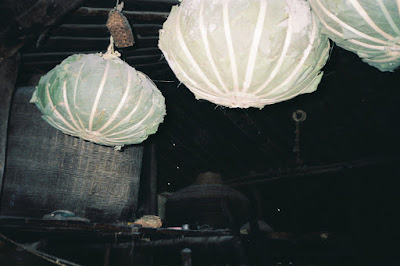
Once the bullocks are done the grain must be separated from the chaff and this depends on the strength of the wind blowing. If the wind does not blow enough then the grain cannot be separated. So the process continues at a leisurely pace for almost three months. Once the grain is separated then the best seeds are kept apart for sowing in the next season and to keep them safe they are packed into a round ball made of teak leaves bound by bamboo strips and hung from the cieling of their huts so that rats cant get at them as shown in the picture below.

Then it is time for the festival of Bhagoria in March when the Bhils really let go of themselves after having all the grain inside their houses. In recent years the Bhagoria festival has been portrayed by the media as being a festival of love where young couples elope with each other. However, that is only a side show of the main intent of the Bhils of enjoying the bounties that nature and their hard labour have given them in the form of a good harvest. The essential part of this celebration is the dancing to the beat of big drums made from hollowing out the trunks of big trees as shown below.

This traditional happy picture has got muddied over the past few decades and since their farms do not support them enough anymore the Bhils have to migrate to do hard labour that they do not enjoy. Thus from being proud farmers labouring for the love of it they have become a part of the vast crowd of unorganised labour that runs the industrial development of India. As such they have become proletarians and so are in need of emancipation from the chains that bind them. Below is a photo of some educated Bhil youth who are living crammed together in one single room in Surat working in the diamond cutting and polishing industry there. These are the biggest earners among the migrant Bhils but they get none of the benefits that traditionally such skilled labour in a factory should have got and lead a totally insecure existence away from their families.

It has been argued by people that the Bhils cannot be kept tied to their traditional way of living in a modern indusrialising economy. True but the point is that they are integrating into this modern economy at the lowest level where they get very little of its benefits. It is appropriate to remember this unfortunate present condition of the once happy go lucky Bhils on this the International Labour Day today.
No comments:
Post a Comment